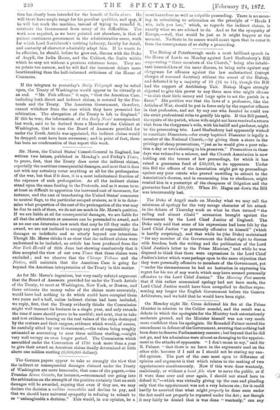Mr. Morse, the United States' Consul-General in England, has written
two letters, published in Monday's and Friday's Times, to prove, first, that the Treaty does cover the indirect claims, especially the maritime consequential damages, and next that it does not with any certainty cover anything at all for the prolongation of the war, but that if it does, it is a most infinitesimal fraction of the expenses of such prolongation. As all the indirect claims stand upon the same footing in the Protocols, and as it seems tons at least as difficult to apportion the increased cost of insurance, for instance, and the cost of transferring the United States' commerce to neutral flags, to the particular escaped cruisers, as it is to deter- mine what proportion of the cost of the prolongation of the war may be due to each of them, we do not see much in Mr. Morse's position. If we are liable at all for consequential damages, we are liable for all that the arbitrators or assessors can be persuaded to award, and as no one can determine how much that may be till they make the award, we are not inclined to accept any sort of responsibility for damages so indefinite and so utterly beyond our intentions. Though Mr. Morse thinks it so clear that the indirect claims were understood to be included, an article has been produced from the New York Herald of 26th June last showing conclusively that it then accepted the view of our own Times that these claims were excluded ; and we observe that the Chicago Tribune and the Nation, still maintain that the American Case is going far beyond the American interpretation of the Treaty in this matter.


































 Previous page
Previous page